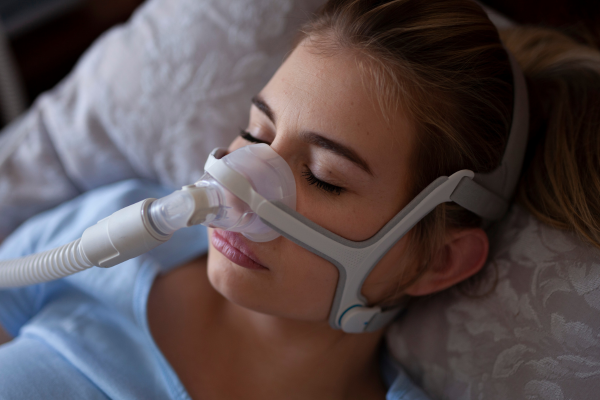Everyone has trouble sleeping sometimes. Usually when you have trouble falling asleep or staying asleep, you notice it. You may also stop breathing in your sleep, without even noticing that it’s happening. In fact, virtually everyone has episodes during the night when they stop breathing. Whether these episodes are normal—as opposed to a significant health problem—depends on how long and frequent they are, and whether they lead to problems while awake.
Sleep apnea is a health condition in which breathing repeatedly stops and starts while sleeping. Since some of the symptoms happen while sleeping, many people with sleep apnea are not aware they have this condition. Read on to learn more about this condition and why it is especially important for Alphas to seek treatment.
What is Sleep Apnea?
Sleep apnea is a sleep disorder in which a person’s breathing is interrupted while they sleep. Obstructive sleep apnea (OSA) is the most common form of sleep apnea. OSA occurs when an individual’s airway becomes blocked during sleep. Factors that increase the likelihood of developing OSA include obesity, older age, male gender, use of sedatives or alcohol, smoking cigarettes, hypothyroidism, anatomical characteristics like a large tongue and narrow airway, and even simply sleeping on one’s back. A rarer disease, central sleep apnea (CSA) occurs when there is an issue in the brain’s communication to the body’s respiratory muscles that results in slower and shallower breathing. Mixed sleep apnea, also referred to as complex sleep apnea, is when a person experiences both OSA and CSA simultaneously.
Symptoms of sleep apnea include:
- Snoring loudly
- Feeling tired, fatigued, or sleepy during the daytime
- Gasping for air when sleeping
- Difficulty staying asleep
- Having a dry mouth, sore throat, or headache when you wake up
- Having trouble focusing during the day
- Have a bed partner report that you stop breathing when you sleep
Why is Sleep Apnea so Dangerous?
Every time breathing stops while sleeping, the brain briefly arouses the sleeping individual for them to resume breathing. This causes their sleep to be extremely fragmented and of poor quality. In addition, consistent oxygen deprivation due to sleep apnea can lead to more severe health issues, ranging from high blood pressure to heart failure. Individuals with severe sleep apnea can have their oxygen levels drop to the point where they are at increased risk of heart attacks or heart rhythm disturbances.
Individuals who have lung disease are especially vulnerable during episodes of apnea. When these episodes are prolonged and occur frequently, blood oxygen levels are lowered. This can cause blood vessels to constrict and place strain on the right side of the heart, which is responsible for pumping blood to the lungs. Over time, the function of the ride side of the heart can become so diminished that fluid backs up and can begin to accumulate in the organs, legs, and eventually throughout the entire body. If you have sleep apnea symptoms, it’s important to seek testing as soon as possible, especially if you are a lung-affected Alpha.
How is Sleep Apnea Diagnosed?
The diagnosis of sleep apnea requires a sleep study. The sleep study may be done in a specialized sleep laboratory or by using sleep laboratory equipment at home. In an overnight sleep lab, a patient’s respiration rate, blood oxygen levels, brain-wave activity, and even leg movements are recorded and then analyzed to log any abnormalities. Sleep apnea severity is determined according to the apnea-hypopnea index (AHI), which measures the number of breathing pauses that you experience per hour that you sleep. Mild sleep apnea is defined by an AHI between 5 and 15, moderate sleep apnea between 15 and 30, and severe sleep apnea greater than 30 events per hour.
What Treatment Options Are Available?
If you have been diagnosed with sleep apnea, work with a healthcare provider to determine the best treatment options for you. Get a referral to a sleep specialist if needed. Treatment options for sleep apnea include:
- Behavioral measures: Weight loss can improve sleep apnea. There are many ways to improve sleep in general, including avoiding caffeine in the afternoon/evening, and not using electronics before bed.
- Oral appliances: This involves wearing a device in your mouth while you sleep. The device helps you breathe while you sleep by preventing the tissue in the airway from collapsing.
- CPAP or BiPAP machines: The most common treatment for sleep apnea is a breathing device called CPAP (continuous positive airway pressure). This device helps you breathe while you sleep by keeping the upper airways open. A CPAP machine delivers the same amount of pressure when you inhale as when you exhale. A BiPAP (bilevel positive airway pressure) machine delivers higher air pressure when you inhale than when you exhale. If you have tried and failed using a CPAP or BiPAP machine, work with a sleep specialist to determine the best treatment options for you.
- Inspire implant: This is an FDA-approved implanted device under the skin that uses electricity to pull back the base of the tongue muscles and open the airway. It is similar to a pacemaker that is turned on to sleep.
More Information about Sleep Apnea
Many people with sleep apnea are not even aware that they have it. Individuals who have been diagnosed may have a limited understanding of what sleep apnea is or how to treat it. The links below provide more information about sleep apnea and options for managing this treatable health condition.
https://www.alphanet.org/AlphaNet/wp-content/uploads/2024/01/Sleep-Apnea-One-Pager-01302024.pdf
https://subscriber.alphanet.org/s/article/6-8-2-what-is-normal-sleep
https://subscriber.alphanet.org/s/article/6-8-3-the-relationship-between-sleep-interruptions-and-lung-disease
https://subscriber.alphanet.org/s/article/6-8-4-treatments-for-sleep-apnea
https://subscriber.alphanet.org/s/article/6-8-5-concerns-about-your-sleep-partners
